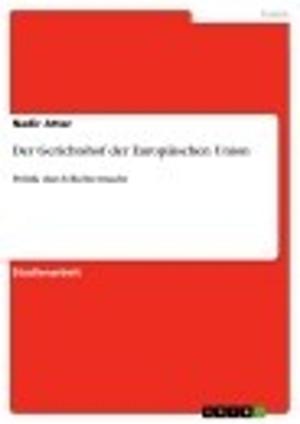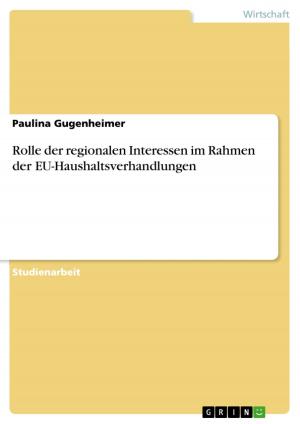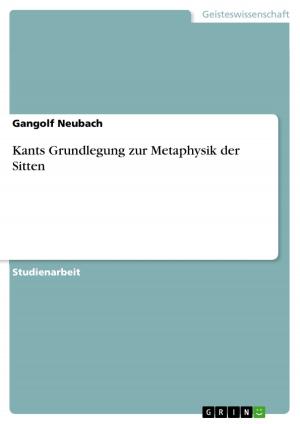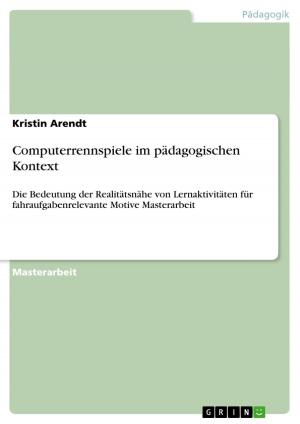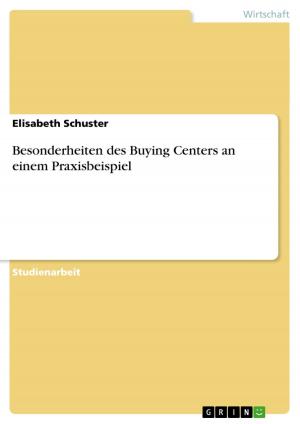Outlook on labor cost development in China (Shanghai region in particular) as a road map for multinational corporations (MNCs)
Challenges for MNCs in Shanghai
Business & Finance, Finance & Investing, Finance| Author: | Markus Fost | ISBN: | 9783656393177 |
| Publisher: | GRIN Verlag | Publication: | March 18, 2013 |
| Imprint: | GRIN Verlag | Language: | English |
| Author: | Markus Fost |
| ISBN: | 9783656393177 |
| Publisher: | GRIN Verlag |
| Publication: | March 18, 2013 |
| Imprint: | GRIN Verlag |
| Language: | English |
Research Paper (postgraduate) from the year 2013 in the subject Business economics - Investment and Finance, grade: 1,3, Nürtingen University (Campus of Finance), course: Global Markets, language: English, abstract: Many observers, business people and in particular investors see labor cost developments in China as one of the main challenges for their Chinese subsidiaries. Especially in the East-coast region around Shanghai, labor cost has risen significantly within the last decade. For investors having subsidiaries in this region, the outlook on labor market might not look much brighter than it used to. Nevertheless, this development results from the impressive shift China has made in such a short period of time. China is now undergoing one of the most massive urbanizations in human history, which becomes nowhere more evident than in Shanghai. The population of this city is officially by now almost 24 million and is forecasted to rise to 30 million by 2020. Consequently, especially low-tech manufacturing plants in the Shanghai region suffer on the one hand from increasing labor cost, on the other hand from the fact that the government changed its focus to higher value-added industries with less pollution output in order to increase the living standard and quality of the population. In general, this trend means that Shanghai attracts high value-added industries such as Finance and Technology since the city offers well educated workforce as well as for sure an amazing flair attracting multinational corporations (MNC). The aim of this assignment is to give a precise short-term outlook on the labor cost development in China, which can be used by (potential) investors or MNCs having their subsidiary in the country. This short-term outlook will be extended by a mid and long-term prognosis, taking into account different regional wage developments as well as the macroeconomic performance of China. The prognosis should give the previously described target group a valid document for further planning matters.
Markus Fost, B.A. cand. MBA, geboren 1984, studierte Betriebswirtschaftslehre an der HfWU Nürtingen-Geislingen. In seiner beruflichen Tätigkeit für namhafte Industrieunternehmen und Beratungsgesellschaften konnte er umfangreiche Erfahrungen im E-Commerce Bereich sammeln. Markus Fost war insgesamt neun Jahre bei der Graupner GmbH & Co. KG beschäftigt, zuletzt im Jahr 2009-2010 als Kaufmännischer Leiter/CFO. Im Jahr 2009 wurde ihm der Vendor Award Aufsteiger des Jahres von Amazon.de im Rahmen seiner Tätigkeit bei der Graupner GmbH & Co. KG verliehen. Derzeit ist Markus Fost beim Elektrowerkzeughersteller metabo im Business Development und als Referent des Vorstandsvorsitzenden (CEO), sowie des Finanzvorstandes (CFO) tätig.
Research Paper (postgraduate) from the year 2013 in the subject Business economics - Investment and Finance, grade: 1,3, Nürtingen University (Campus of Finance), course: Global Markets, language: English, abstract: Many observers, business people and in particular investors see labor cost developments in China as one of the main challenges for their Chinese subsidiaries. Especially in the East-coast region around Shanghai, labor cost has risen significantly within the last decade. For investors having subsidiaries in this region, the outlook on labor market might not look much brighter than it used to. Nevertheless, this development results from the impressive shift China has made in such a short period of time. China is now undergoing one of the most massive urbanizations in human history, which becomes nowhere more evident than in Shanghai. The population of this city is officially by now almost 24 million and is forecasted to rise to 30 million by 2020. Consequently, especially low-tech manufacturing plants in the Shanghai region suffer on the one hand from increasing labor cost, on the other hand from the fact that the government changed its focus to higher value-added industries with less pollution output in order to increase the living standard and quality of the population. In general, this trend means that Shanghai attracts high value-added industries such as Finance and Technology since the city offers well educated workforce as well as for sure an amazing flair attracting multinational corporations (MNC). The aim of this assignment is to give a precise short-term outlook on the labor cost development in China, which can be used by (potential) investors or MNCs having their subsidiary in the country. This short-term outlook will be extended by a mid and long-term prognosis, taking into account different regional wage developments as well as the macroeconomic performance of China. The prognosis should give the previously described target group a valid document for further planning matters.
Markus Fost, B.A. cand. MBA, geboren 1984, studierte Betriebswirtschaftslehre an der HfWU Nürtingen-Geislingen. In seiner beruflichen Tätigkeit für namhafte Industrieunternehmen und Beratungsgesellschaften konnte er umfangreiche Erfahrungen im E-Commerce Bereich sammeln. Markus Fost war insgesamt neun Jahre bei der Graupner GmbH & Co. KG beschäftigt, zuletzt im Jahr 2009-2010 als Kaufmännischer Leiter/CFO. Im Jahr 2009 wurde ihm der Vendor Award Aufsteiger des Jahres von Amazon.de im Rahmen seiner Tätigkeit bei der Graupner GmbH & Co. KG verliehen. Derzeit ist Markus Fost beim Elektrowerkzeughersteller metabo im Business Development und als Referent des Vorstandsvorsitzenden (CEO), sowie des Finanzvorstandes (CFO) tätig.

